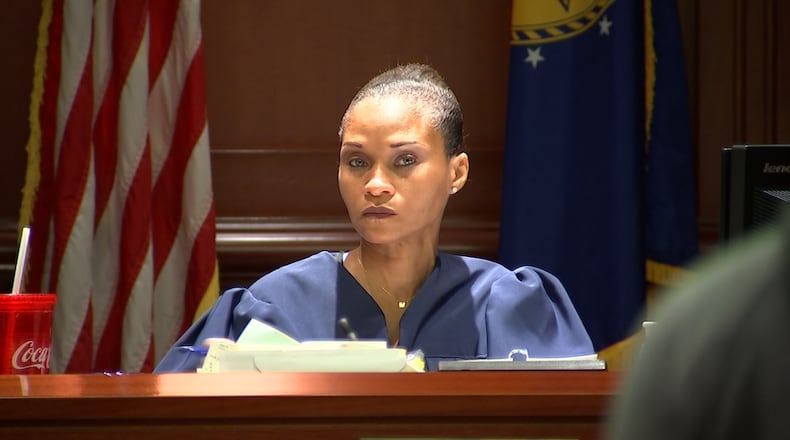The state’s judicial watchdog on Wednesday filed ethics charges against Atlanta Municipal Court Judge Terrinee Gundy, accusing her of chronic tardiness and absenteeism — and then covering it up.
The charges against Gundy were brought by the Judicial Qualifications Commission’s investigative panel in a filing before the Georgia Supreme Court. They are the culmination of a lengthy JQC investigation of Gundy, who has been a city judge since 2013.
Efforts to reach Gundy, 45, were unsuccessful. Her lawyer, Frank Strickland, declined to comment on the allegations.
The nine charges filed by the JQC allege varying degrees of misconduct by Gundy. These include failing to provide required hearings to at least six defendants, resulting in them being unlawfully incarcerated, as well as making false statements to the commission, which is a possible felony under state law.
From September 2015 through February 2018, Gundy also failed to show up to work on time, the charges allege. For this reason, she violated the judicial canons of ethics by failing to fairly and efficiently dispose of cases before her because she repeatedly arrived at the courthouse after she was supposed to be presiding over cases in her own courtroom, the filing said.
Gundy also disabled or removed an audio-visual recording system at the courthouse to conceal her tardiness, the charges allege. And she told the court’s operations manager to stop producing “case count” calendars to further conceal her improper absenteeism, the charges allege.
Once the JQC opened its investigation, Gundy made false statements to the commission, both in written responses and when she appeared before the commission’s board, the filing said.
Former JQC chairman Lester Tate, who has also represented judges under investigation by the commission, said the ethics charges are a serious matter.
“Anytime you have a judge against which charges have been filed by the JQC, it’s a big deal,” Tate said.
As for the judicial canons of ethics, he said: “It’s more like the Ten Commandments rather than a specific legal statute.”
Gundy’s case now proceeds to a three-person hearing panel of the JQC chaired by Fulton County Superior Court Chief Judge Robert McBurney. If the panel finds Gundy violated judicial ethics rules, it can recommend punishment ranging from a reprimand to removal from the bench. The state Supreme Court will have the final say on the matter.
Richard Hyde, the JQC’s vice chairman said the “charges filed allege various acts of misconduct by Judge Gundy and speak for themselves.”
The JQC filing was signed by Ben Easterlin, the commission’s director, and attorney Fani Willis, the former Fulton County prosecutor who headed the Atlanta Public Schools test-cheating case.
City taxpayers funded $56,000 of Gundy's legal defense, before Atlanta City Attorney Nina Hickson wrote a letter to Strickland saying it was improper under state law to use public money to pay for a private legal matter. Jeremy Berry, who was hired as city attorney by Reed, is the person who approved the use of public money for Gundy's legal bills in a March 2018 letter to Strickland that did not mention Gundy by name.
The letter said Strickland would be paid $600 an hour “in the matter of a Judge.”
Hickson became city attorney after Berry resigned.
Not included in the charges against Gundy is nearly $10,000 of public money spent on glass sculptures; a party hosted by former Mayor Kasim Reed, with whom she had a personal relationship; and luxurious stationery, including gold-sealed letterhead.
One of the $600 glass sculptures was engraved to read: “Mayor Kasim Reed, Flame of Excellence.” Reed appointed Gundy to the bench.
About $2,500 of the spending went for tickets handed out to people invited to the after-party for Reed’s Masked Ball, an elegant social event hosted by the mayor to raise money for the United Negro College Fund.
“We need them on the fancier side, as it’s for a city event,” says an Oct. 30, 2017, email from Gundy’s assistant to the account manager for the printing company.
The Municipal Court is a $20 million operation, funded through the city budget. The spending documents reviewed by Channel 2 Action News and the AJC show that neither Gundy nor any member of her staff sought approval for any of the purchases, nor do they indicate that anyone in the city’s finance department signed off on them.
Among the new charges against Gundy, who draws an annual salary of $182,000, is that she threatened to fire a court security officer if he failed to secure seats for her and her family at the 2018 mayoral inauguration. She also allegedly used “profane language … in a hostile and abusive manner” to fellow Municipal Court Judge Christopher Ward, the filing said.
Our reporting
The Atlanta Journal-Constitution raised questions in several stories last year about Municipal Court Judge Terrinee Gundy’s spending of public money after Channel 2 Action News reported about her sporadic court attendance. The AJC and Channel 2 also found that city taxpayers improperly paid $56,000 of Gundy’s legal fees in relation to the Judicial Qualifications Commission complaint, after former City Attorney Jeremy Berry authorized the spending. Berry was hired as city attorney by former Mayor Kasim Reed, who appointed Gundy to the bench in 2013.
The Latest
Featured





